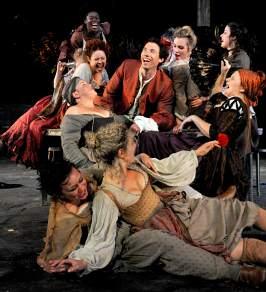The Beggar's Opera
Two huge carts and an enormous wooden frame forming a gallows, are the principal features of William Dudley's impressive design for this revival of John Gay's ballad opera written in 1728. And that is as it should be because the principal characters of this racy, bawdy tale are low-life criminals and those who make their fortunes by capturing and then hanging them.
In the England of the eighteenth century, Italian Opera had become immensely popular, even if those who ventured out to see it couldn't understand what was being sung. The popularity of that genre spawned a kind of backlash, resulting in Gay writing 'The Beggar's Opera'.
The story revolves around Mr and Mrs Peachum who make their living by catching thieves and selling their stolen goods. When these two discover that their daughter, Polly, has married an infamous highwayman, Macheath, they resolve to capture and kill him. Polly manages to warn Macheath, but his love of women leads him to a tavern where he is captured and subsequently incarcerated in the infamous Newgate prison. Fighting breaks out almost at every opportunity as the plot unfolds. Macheath's gang fight among themselves, Peachum fights with his gaoler accomplice, Polly fights over Macheath with Lucy, a woman who is bearing Macheath's child and who also claims to be married to him.
Unlike modern musicals where songs can last for what often seems like an eternity, here the songs are brief - in some cases no more than a single verse. The music is based on well-known songs of the day, so the eighteenth century audiences would have recognised most of them pretty-well instantly, and some still have the ring of familiarity. The excellent musical accompaniment here is provided by The City Waites.
Lucy Bailey's articulate production is based solidly on the impression of the times handed down to us in Hogarth's paintings and cartoons. The staging is strikingly authentic, with one crowd scene towards the end resembling an animated version of one of Hogarth's works. The enormous carts - used in the eighteenth century to hang criminals - double-up as cells in Newgate and the gallows get put to use at the end with multiple, simultaneous hangings.
David Caves is the philandering highwayman, Macheath, whose classically-handsome features and striking build more than convince of his ability to charm women. Beverley Rudd as the fiery Lucy Lockitt and Flora Spencer-Longhurst as the spirited Polly Peachum, ably battle it out for Macheath, and there's good support from Jasper Britton as Mr Peachum and Phil Daniels as Mr Lockitt, the gaoler.
Near the close, we are told that 'opera must have a happy ending, no matter how absurdly things are brought about'. Though John Gay may have set out to lampoon opera, he ended-up creating a completely new genre and 'The Beggar's Opera' is still the best known and most successful of its kind. This revival starts a little sluggishly, but moves into gear in the second half where there's more humour to bolster the plot and, thus, the enjoyability. However, the real virtue lies in the excellent staging which gives us an authentic view of a time where opera might have been fashionable, but watching people being hanged was entertainment for the masses.
"At its best, The Beggar's Opera proves a darkly entertaining night in the park and Lucy Bailey's production is the most persuasive account of this perplexing classic I have seen."
Charles Spencer for The Daily Telegraph
"Delightful production...Where the show most succeeds is in projecting Gay's point that the criminal underworld was a mirror image of high society...It's a fine show "
Michael Billington for The Guardian
External links to full reviews from popular press
Daily Telegraph - The Guardian
Originally published on
